Drug Expert Says More Brits Should Consume Ginger Either In Meals Or As A Supplement

SummaryGinger is not just a spice; it is a quiet multitasker that is steadily earning the respect of scientists and pharmacists. Whether you grate it into your stir-fry, steep it in tea, or pop it in capsule form, there are plenty of reasons to bring this humble root into your daily routine.
End of Article
